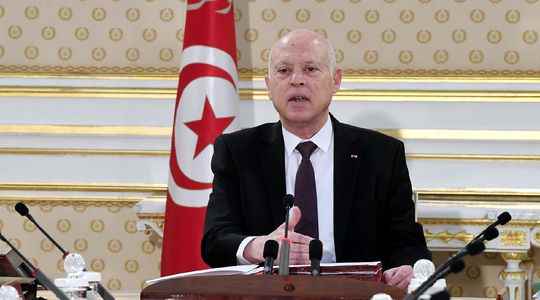It’s a resurrection that would make you smile if it didn’t awaken so many bitter memories. That of a seemingly harmless character, a good-natured fennec fox well known to Tunisian kids in the 1990s. With his big ears, blue suit and shoulder bag, “Labib” was the chosen mascot, under the reign of Zine el-Abidine Ben Ali, to make the general public aware of the protection of nature on television, in plush version and in giant statue, in all the cities of the country. Then the 2011 revolution broke out and the effigies of the moralizing fennec fox, who despite himself had become the emblem of the dictatorship, were unbolted or crippled. Officially banned in 2012, “Labib” will make a comeback, the government announced in early February… for a good environmental cause.
The news has disconcerted some, seeing in this comeback a cynical nod to the old regime, the ultimate symbol of the great leap towards the past operated by President Kaïs Saïed. It must be said that the head of state, elected in October 2019 (with 72.7% of the vote), has a weakness for symbols. The former law professor thus chose to confiscate all powers on July 25, 2021, on the evening of the 64th anniversary of the advent of the republic in Tunisia. The sequel is a rewind, in accelerated mode, of the decade 2011-2021, which gave birth to an – imperfect – parliamentary democracy. “Tunisia is making great strides towards the authoritarianism of the Ben Ali era, deplores Youssef Chérif, an analyst at Columbia Global Centers in Tunis. We are witnessing a methodical unraveling of all the bodies that were created after 2011 to prevent power is concentrated in the hands of one man.”
“An unprecedented risk of violence”
The first institution targeted, Parliament, frozen on July 25 on the pretext of “imminent danger”, against a backdrop of crisis between the presidency and the Islamist party Ennahdha, the majority in the Hemicycle, but increasingly unpopular. Eight months later, the Assembly is dissolved. In August 2021, the National Anti-Corruption Authority was closed by decree. March 2022, the Superior Council of the Judiciary, deemed corrupt, suffers the same fate, replaced by a temporary body. The president can dismiss “any judge who fails in his professional duties”.
On April 22, he drove the point home by claiming the right to appoint the boss of the Electoral Authority, three months before a constitutional referendum. Meanwhile, the hunt for “spies” and “corrupts” has brought civilians before military tribunals; “hundreds, even thousands of business leaders, politicians and magistrates” have been targeted by administrative control measures, according to an alarming report by the International Crisis Grouppublished on April 6.
With each new step taken, Saïed invokes “the will of the people”, which, it is true, applauded his initial coup with scenes of jubilation. “On July 25, we all believed in the possibility of change, after a decade spent under the thumb of the Islamist party Ennahdha, explains Najla Arfa, of the Tunisian Forum for Economic and Social Rights. But their deputies only worked to their interest and precariousness exploded.” Today, the country has 4 million poor people, or a third of its population. Kaïs Saïed wants to be their first defender, in speeches with populist accents.
From the palace of Carthage, the luxurious presidential residence facing the Mediterranean, the “reïs” had even affirmed, on February 10, to refuse to “sit next to someone who smells of wealth”. To the most modest, he promised a lot, so much so that some ironically nicknamed him “the president of hugs”. But the results are long overdue and social unrest is mounting. “The president does not have the means to respond to the demands”, continues Najla Arfa. Graduates-unemployed, construction workers, substitute teachers, all these precarious people become disillusioned and begin to protest locally. “Tunisia is exposed to an unprecedented risk of violence,” warns the International Crisis Group. The NGO calls on Kaïs Saïed to “define an economic policy”, a sine qua non condition for obtaining aid from the International Monetary Fund. At stake, for the president, social peace. And perhaps, one day, his seat in the palace of Carthage.
